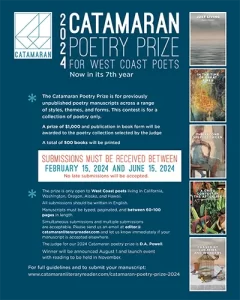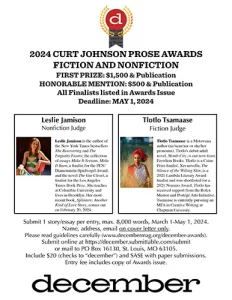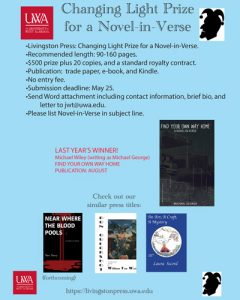CALYX – Summer 2009
Volume 25 Number 2
Summer 2009
Triannual
Terri Denton
This issue of Calyx is presented beautifully, and its premise has more beauty still. Composed, as they tell you, of women’s art and literature alone, it breathes a carefully balanced delicacy. Perhaps it is because I am a woman, but I found every piece within Calyx’s covers to be somehow special.
This issue of Calyx is presented beautifully, and its premise has more beauty still. Composed, as they tell you, of women’s art and literature alone, it breathes a carefully balanced delicacy. Perhaps it is because I am a woman, but I found every piece within Calyx’s covers to be somehow special.
For example, in Sara Dailey’s poem “Biological Galaxies,” she asks that the reader “Consider our bodies, precise systems of tubes and / glands, more miracle than machine.” Her words then glide in and out of time and space as she writes, “Your every cell is a galaxy, with its own ellipses and / orbits, your nuclei like miniature suns lighting up your / insides.” Next, at once, she is on more terrestrial footing, and speaking to someone with whom she shares intimacy, a lover or a child, perhaps – she does not specify. But when she writes, “So it is no mistake when I tell you your movements are / tidal, or that when I want you so close it is because gravity is like / that, or that when I hold you I am holding the world,” the reader grasps the very gravity of Dailey’s words.
There is an intimacy to many of the pieces in this issue of Calyx, and Mary Kolada Scott’s is no exception. In her poem “Bounty,” she explores a mother’s tenuous hold on her adult son. “No Christmas gifts. Never flowers on Mother’s Day,” says Scott. But these words are not what they appear – no lamenting here. “For no occasion at all, my son brings me . . . rickety wine boxes riddled with splinters, / a Christmas card posted from jail, / lottery tickets on my birthday / that didn’t win but I prize anyway.” Scott’s final words will touch your heart, for she keeps these gifts, as she writes, “nestled in an aquamarine Tiffany box / I rescued from a wastebasket / and that held nothing / this valuable before.”
There is ingenuity here, too. Patricia Cumming’s utterly unique “Two poems for a Mirrored Room”; rendered on the page as if among mirrors, one side of her poem echoes the other. To be specific about the poem would be to spoil its fun, so I will say only that the left side of her poem works as beautifully by itself as when combined with the right side.
A standout among the short fiction is “Living Waters” by Leslie What. Two Jewish women, one devout, one not, make a trip to what are said to be the healing and cleansing waters of a lake. Bekah, friend to this story’s narrator, is the observant Jew upon whose pilgrimage they make their way. The narrator explains her non-observant life in this rather succinct and creatively wicked way: “I don’t aspire to a life without grudges.”
There is both art and photography to be found on these pages, and they, too, are unique. Nancy Ryan Keeling’s observation of her photo, “Father’s Day” wraps up, I believe, the entire issue of this edition of Calyx. In the picture, a man stands behind his teenage daughter, twisting her delicate hair into cornrows. Keely says of the image: “And every once in a while, as in Father’s Day, an act of intimacy is captured.”
[www.calyxpress.org]




